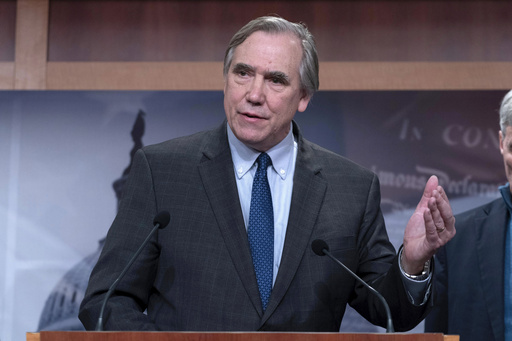
WASHINGTON — On Wednesday, House Republicans unveiled a budget strategy aimed at facilitating the implementation of several key domestic initiatives championed by President Donald Trump. This plan encompasses tax reductions totaling as much as $4.5 trillion and proposes a $4 trillion increase in the debt ceiling, which would allow the U.S. to manage its financial obligations without interruption.
The budget outline mandates various House committees to collectively reduce spending by at least $1.5 trillion, with a target of achieving $2 trillion in savings over the next decade. This proposal marks an initial phase in a comprehensive legislative process, enabling Republicans to advance some of their main priorities with a simple majority vote. The House Budget Committee is slated to vote on the proposal on Thursday, and House Speaker Mike Johnson anticipates a smooth passage out of the committee.
“We’ll collaborate with everyone throughout the week to secure their support,” Johnson stated. However, there are existing tensions within the Republican Party regarding the extent of proposed tax and spending reductions. Some members are pushing for more extensive tax cuts, while others are advocating for greater cuts to spending.
“There will be substantial negotiations involved,” Johnson noted. “Numerous elements are at play here, but our goal is to fulfill all the president’s campaign commitments and complete the overall agenda, which we have time to do.”
Frequently regarded as reflections of priorities, budget resolutions can also direct specific legislative actions. This 45-page proposal does exactly that, providing guidance to House committees on how to realign federal spending. Republican leaders are considering significant reductions in social services, particularly within the Medicaid program, to secure considerable savings.
For instance, the Energy and Commerce Committee, responsible for health care expenditures, is directed to find $880 billion in cuts over the next ten years. The Education and Workforce Committee has a target reduction of $330 billion, while the Agriculture Committee aims to save $230 billion and the Transportation and Infrastructure Committee is tasked with identifying a minimum of $10 billion in cuts over the same period.
As some programs encounter budget cuts, funds are expected to be redirected towards other Trump initiatives, including a $100 billion increase in defense budgets over the next decade through the Armed Services Committee. Additionally, there is a proposal for an extra $90 billion for the Homeland Security Department to support extensive immigration enforcement.
House Democrats responded critically to the proposed budget plan, with Senate Democratic leader Chuck Schumer and House Democratic leader Hakeem Jeffries holding a press conference where they accused Republicans of failing to take meaningful action to lower costs for average Americans since taking control of the White House and Congress.
“Why? Their main goal is to push through enormous tax cuts for their affluent contributors and corporations,” remarked Jeffries. Concerns have also arisen regarding possible reductions to essential safety net programs. Rep. Brendan Boyle, the leading Democrat on the House Budget Committee, argued that tax cuts would not lead to self-financing through economic growth and predicted that various government programs like Medicaid could face cuts.
“Their approach increases the deficit and passes the burden to the middle class, either through price hikes, substantial cuts to critical programs, or both,” stated the Philadelphia representative. Nevertheless, Republicans suggest that they do not intend to strip benefits from those relying on Medicaid, but they are exploring implementing work requirements for able-bodied individuals participating in the program.
“If we incorporate work requirements into Medicaid, it resonates with people. It’s a practical approach,” Johnson asserted. “Such adjustments can significantly impact both budgeting and public sentiment. There is value in work. People find dignity in it, and we aim to engage those who are not contributing.”
In an effort to mitigate some expenses associated with the extension of tax cuts from Trump’s first term, Republicans are also evaluating the elimination of certain clean-energy tax incentives that were endorsed by Democrats during Joe Biden’s presidency.
While House Republicans push forward, their Senate counterparts are concentrating on a narrower strategy aimed at enhancing border security and defense funding. Since last year, there has been an ongoing internal debate among Republicans regarding whether to introduce Trump’s agenda in one cohesive package or in multiple phases. The Senate is adopting a two-bill approach, while the House is pursuing a single-bill timeline, leaving the ultimate outcome uncertain.
On Wednesday, the Senate Budget Committee approved a more focused budget proposal on a strict party-line vote. This plan allocates $175 billion for border security, $150 billion for defense, and $20 billion for the Coast Guard. This budget does not incorporate an extension of tax cuts, leaving that issue to be tackled in a subsequent bill later this year.
Sen. Lindsey Graham, chair of the committee, noted that a significant majority of Americans support the deportation of undocumented immigrants, yet he pointed out that Immigration and Customs Enforcement is facing funding shortages. He emphasized that increased personnel and detention facilities will be crucial for an effective deportation initiative.
“We cannot afford to delay,” stated the South Carolina Republican. “Our nation confronts multiple risks both at home and abroad.” In a recent committee meeting, Republicans successfully defeated a series of amendments from Democrats aimed at protecting Medicaid and the Supplemental Nutrition Assistance Program from budget cuts. Sen. Jeff Merkley, the leading Democrat on the committee, expressed concern that the ongoing congressional initiatives might increase costs for essential healthcare and other services.
“American families should be alarmed,” he cautioned as the debate wrapped up.

